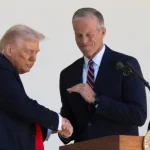
Authored by Mitch Nemeth via The Mises Institute,
In the past decade, the growth of the Internet and social media has brought with it a dramatic uptick in populist sentiment.
Legacy institutions have declared war against populism, referring to its claims as “misinformation” or “disinformation” and calling on the government or government-adjacent actors (herein referred to as “the censors”) to clamp down on such claims as they spread across the Internet like wildfire.
The censors rarely decline these opportunities to silence criticism, justifying the censorship as a matter of “national security.”
More than other Western nations, the United States champions freedom of speech.
But it has frequently failed in its aspirations, beginning in 1798 with the Alien and Sedition Acts.
There are countless examples since then of the US failing to adhere to its core value system, too many to recount in one brief article.
The Internet Lets Claims Spread Like Wildfire
Beginning with the Arab Spring in 2010, the extent to which social media could foster grassroots campaigns against perceived tyranny or injustice became increasingly apparent. Martin Gurri, a former CIA analyst, has commented on such phenomena at length in his book, The Revolt of the Public and the Crisis of Authority in the New Millenium.
The nation-state correctly perceives in revolutions a threat to its existing foundations and deploys various methods to crush dissent. Western nations do not typically deploy the military against the masses or declare martial law. The US has taken a different but directionally similar approach, whereby law enforcement and intelligence agencies form cozy partnerships with private actors, such as social media platforms, financial institutions, and other digital intermediaries.
After the Great Recession, populist movements, like Occupy Wall Street on the Left and the Tea Party movement on the Right, garnered dramatic support across Western nations. As with most populist movements, a significant number of the activists embraced ideas branded as “conspiracy theories” by the established order. Rather than examining these allegations, the established order preferred to label the entire movement “crazy” or “conspiratorial.”
Since the movements began, there has been a significant convergence of Occupy Wall Street and Tea Party thought leaders. It is no coincidence that, despite their different politial affiliations, Glenn Greenwald, Matt Taibbi, and Michael Shellenberger often sound like Tucker Carlson, Dan Bongino, and Donald Trump when it comes to criticizing the government and legacy institutions.
Each of these men has been personally targeted by the censorship industrial complex.
The Twitter Files Expose the Censorship Racket
On March 9, 2023, Michael Shellenberger delivered his testimony to the House Select Subcommittee on the Weaponization of the Federal Government, which he titled “The Censorship Industrial Complex.” In sixty-eight pages, Michael Shellenberger outlines how “Americans taxpayers are unwittingly financing the growth and power of a censorship-industrial complex run by America’s scientific and technological elite.” He also discusses how the Twitter Files documents “have revealed a large and growing network of government agencies, academic institutions, and nongovernmental organizations that are actively censoring Americans citizens, often without their knowledge.”
In his testimony, Shellenberger aptly describes the censorship industrial complex as “a network of ideologically-aligned government, NGO, and academic institutions that discovered over the last few years the power of censorship to protect their own interests against the volatility and risks of the democratic process.” This contention strongly rebuts the ridiculous claim made by corporate media outlets that censorship is often necessary to “protect our democracy.” For legacy institutions, an apparent devotion to democracy is often little more than a cover for kleptocracy, something Fred Siegel touches on in The Revolt against the Masses: How Liberalism Has Undermined the Middle Class.
On August 7, 2023, Michael Shellenberger’s Substack exposed the censorship racket between Facebook executives and the White House. The authors note that “newly released internal emails show that Facebook executives felt pressure to comply with White House demands in order to resolve a European Union ban on the social media company’s ability to transfer the data of European users to its servers in the United States.” In the past few years, the European Union has taken a heavy-handed regulatory approach toward US-based social media platforms. These platforms relied on the US to advocate for them during the negotiation of the EU-US Data Privacy Framework. Without a clear, negotiated framework, these firms would feel significant financial pressure. As the authors of the Substack article note, “The series of events suggests a quid pro quo. Facebook would bow to White House requests for censorship in exchange for its help with the European Union.”
In the past decade, the censorship industrial complex has gained considerable momentum and institutional support. Elite support for censorship is so entrenched that the Harvard Kennedy School published a commentary in September 2022 titled, “Mis- and disinformation studies are too big to fail.” While Elon Musk’s takeover of Twitter has dimmed opportunities for the censorship industrial complex, there is still much to be done.
In February 2021, an article in Time described a “shadow campaign” that manipulated the 2020 election in the legacy institutions’ preferred direction.
If activists are to dismantle the censorship industrial complex, they must do more than expose the machinery—they must win elections.
Authored by Mitch Nemeth via The Mises Institute,
In the past decade, the growth of the Internet and social media has brought with it a dramatic uptick in populist sentiment.
Legacy institutions have declared war against populism, referring to its claims as “misinformation” or “disinformation” and calling on the government or government-adjacent actors (herein referred to as “the censors”) to clamp down on such claims as they spread across the Internet like wildfire.
The censors rarely decline these opportunities to silence criticism, justifying the censorship as a matter of “national security.”
More than other Western nations, the United States champions freedom of speech.
But it has frequently failed in its aspirations, beginning in 1798 with the Alien and Sedition Acts.
There are countless examples since then of the US failing to adhere to its core value system, too many to recount in one brief article.
The Internet Lets Claims Spread Like Wildfire
Beginning with the Arab Spring in 2010, the extent to which social media could foster grassroots campaigns against perceived tyranny or injustice became increasingly apparent. Martin Gurri, a former CIA analyst, has commented on such phenomena at length in his book, The Revolt of the Public and the Crisis of Authority in the New Millenium.
The nation-state correctly perceives in revolutions a threat to its existing foundations and deploys various methods to crush dissent. Western nations do not typically deploy the military against the masses or declare martial law. The US has taken a different but directionally similar approach, whereby law enforcement and intelligence agencies form cozy partnerships with private actors, such as social media platforms, financial institutions, and other digital intermediaries.
After the Great Recession, populist movements, like Occupy Wall Street on the Left and the Tea Party movement on the Right, garnered dramatic support across Western nations. As with most populist movements, a significant number of the activists embraced ideas branded as “conspiracy theories” by the established order. Rather than examining these allegations, the established order preferred to label the entire movement “crazy” or “conspiratorial.”
Since the movements began, there has been a significant convergence of Occupy Wall Street and Tea Party thought leaders. It is no coincidence that, despite their different politial affiliations, Glenn Greenwald, Matt Taibbi, and Michael Shellenberger often sound like Tucker Carlson, Dan Bongino, and Donald Trump when it comes to criticizing the government and legacy institutions.
Each of these men has been personally targeted by the censorship industrial complex.
The Twitter Files Expose the Censorship Racket
On March 9, 2023, Michael Shellenberger delivered his testimony to the House Select Subcommittee on the Weaponization of the Federal Government, which he titled “The Censorship Industrial Complex.” In sixty-eight pages, Michael Shellenberger outlines how “Americans taxpayers are unwittingly financing the growth and power of a censorship-industrial complex run by America’s scientific and technological elite.” He also discusses how the Twitter Files documents “have revealed a large and growing network of government agencies, academic institutions, and nongovernmental organizations that are actively censoring Americans citizens, often without their knowledge.”
In his testimony, Shellenberger aptly describes the censorship industrial complex as “a network of ideologically-aligned government, NGO, and academic institutions that discovered over the last few years the power of censorship to protect their own interests against the volatility and risks of the democratic process.” This contention strongly rebuts the ridiculous claim made by corporate media outlets that censorship is often necessary to “protect our democracy.” For legacy institutions, an apparent devotion to democracy is often little more than a cover for kleptocracy, something Fred Siegel touches on in The Revolt against the Masses: How Liberalism Has Undermined the Middle Class.
On August 7, 2023, Michael Shellenberger’s Substack exposed the censorship racket between Facebook executives and the White House. The authors note that “newly released internal emails show that Facebook executives felt pressure to comply with White House demands in order to resolve a European Union ban on the social media company’s ability to transfer the data of European users to its servers in the United States.” In the past few years, the European Union has taken a heavy-handed regulatory approach toward US-based social media platforms. These platforms relied on the US to advocate for them during the negotiation of the EU-US Data Privacy Framework. Without a clear, negotiated framework, these firms would feel significant financial pressure. As the authors of the Substack article note, “The series of events suggests a quid pro quo. Facebook would bow to White House requests for censorship in exchange for its help with the European Union.”
In the past decade, the censorship industrial complex has gained considerable momentum and institutional support. Elite support for censorship is so entrenched that the Harvard Kennedy School published a commentary in September 2022 titled, “Mis- and disinformation studies are too big to fail.” While Elon Musk’s takeover of Twitter has dimmed opportunities for the censorship industrial complex, there is still much to be done.
In February 2021, an article in Time described a “shadow campaign” that manipulated the 2020 election in the legacy institutions’ preferred direction.
If activists are to dismantle the censorship industrial complex, they must do more than expose the machinery—they must win elections.
Loading…






